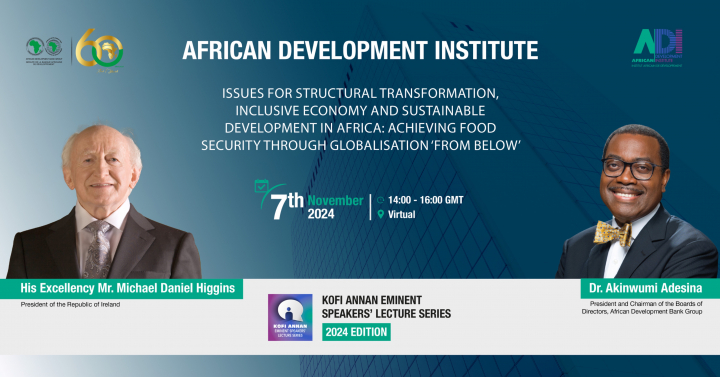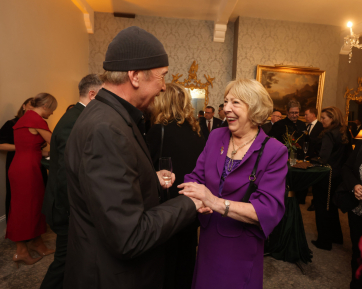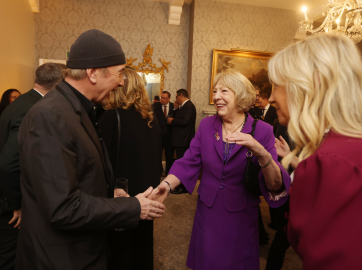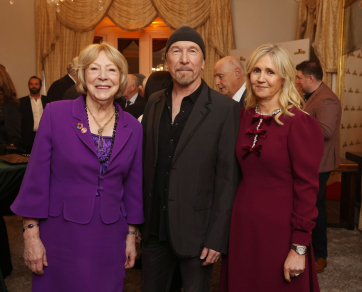
Uachtarán na hÉireann, President Michael D. Higgins this afternoon delivered the 2024 Kofi Annan Eminent Speakers’ Lecture in a live online event from the State Reception Room in Áras an Uachtaráin.
President Higgins was invited to deliver this year’s lecture by the President of the African Development Bank, Dr Akinwumi Adesina. The lecture series was launched in 2006 and in 2018 was renamed in honour of the former Secretary-General of the United Nations, Kofi Annan.
The lecture has been previously delivered by seven Nobel laureates, including winners of the Nobel Peace Prize, the Nobel Prize in Literature and the Nobel Memorial Prize in Economic Sciences, as well as by a number of Heads of State, Heads of Government, academics and heads of global institutions.
President Higgins’ lecture is titled Achieving Food Security through Globalisation ‘from Below’: Issues for Structural Transformation, Inclusive Economy and Sustainable Development in Africa.
In his lecture, the President highlighted the vital importance of moving past previous reactive emergency humanitarian responses to famine, food insecurity and global poverty, and undertaking the bigger and repeating challenge of tackling the underlying structural causes of hunger
In proposing a globalisation ‘from below’, the President suggested that food security can be best seen as an essential part of universal basic services and, in that way, can make a key contribution to the delivery of the UN Sustainable Development Goals and Agenda 2030.
President Higgins called on the international community to recognise that there is an urgent, severe debt service crisis facing many countries, and to make tackling that crisis a priority.
The President said:
“Debt is crippling so many African countries who are now facing the worst debt crisis in history. In so many countries, spending on health and education is being cut, while nearly half of budgets are being used to pay creditors.”
“What an appalling statistic it is that debt service exceeds social spending by two-thirds in Africa and low-income countries. As a result of the debt crisis, children are starving, AIDS victims are dying, the planet is burning, extreme poverty is rising, human rights are being abused, and thousands of species are disappearing.”
The President supported the calls which have been made by organisations such as Debt Relief International to reduce debt service payments to less than 15% of budget revenues. Such a move which could make approximately $100 billion annually available to fund social and environmental policies and measures in Sub-Saharan Africa.
The President also drew particular attention to what he described as ‘the forgotten war in Sudan’, which he said risks triggering the world’s largest hunger crisis. The President said that an immediate ceasefire is needed to prevent a completely collapse in Sudan and further regional destabilisation as millions flee into neighbouring countries. The President further highlighted the exceptional food crises created by the ongoing conflicts in Gaza, Lebanon and the surrounding region.
The President has written extensively on the topic of food security, including reflecting on the repeated crises which have arisen since he first travelled to Somalia and saw first-hand the devastation of the famine in that country in 1992.
In June of this year, the President’s work in this area was recognised when he was awarded the Agricola Medal of the United Nations Food and Agriculture Organisation (FAO) at a ceremony at Áras an Uachtaráin.
The President’s Kofi Annan lecture builds on the paper which he delivered upon receipt of the Agricola Medal, as well as on the previous papers on the topic of food security which he has delivered at the Africa Food Summit in Dakar in January 2023 and at the World Food Forum in Rome in October 2023, as well as on his address to the UN Summit of the Future during the UN General Assembly in New York in September 2024.
The President has consistently raised the importance of food security, and the linkages between it and the interlocking global crises of global poverty, migration, debt and climate change in his meetings with global leaders. This has included in meetings over the last year with US President Joe Biden, His Holiness Pope Francis, the Premier of the People’s Republic of China Li Qiang, and the incoming President of the European Council António Costa among others.
President Higgins further discussed the topics in a number of his meetings at the United Nations General Assembly in September, including with the President of South Africa, Cyril Ramaphosa, the President of Malawi, Lazarus Chakwera, the President of Brazil, Luiz Inácio Lula da Silva, and the Prime Minister of Barbados, Mia Mottley.




